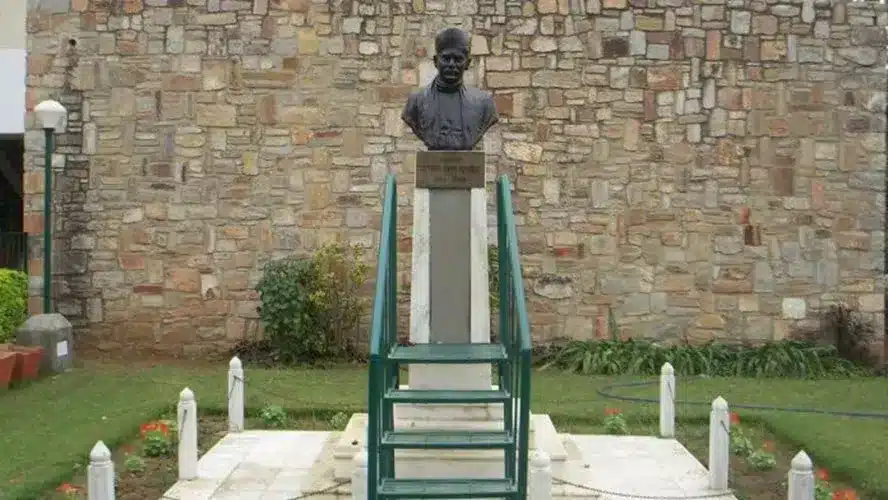Education for All: The Enduring Legacy of Madan Mohan Malaviya

Madan Mohan Malaviya (25 December 1861 – 12 November 1946) was a great freedom fighter, politician, and educationist, but also a great social reformer. He was respectfully addressed by the title Pandit and also addressed as Mahamana which means compassionate. The “Mahamana” title was conferred to him by Rabindranath Tagore.
He was also the founder of Benares Hindu University (BHU). According to historian VC Sahu, Madan Mohan Malviya, a supporter of Hindu nationalism, wanted to break the caste shackles from the country. He launched a nationwide movement against the evil of prohibition of entry in the temples of Dalits. On 24 December 2014, the President of India, Pranab Mukherjee, posthumously awarded the country’s highest civilian award ‘Bharat Ratna’ to Pandit Madan Mohan Malaviya.
Childhood and Education
Malaviya was born in Allahabad (now Prayag raj), India on 25 December 1861, in a Hindu family to Pandit Brijnath and Moona Devi. The locality in which he was born is currently known as Malviya Nagar. The early education of Malaviya started at the age of five in Mahajani Pathsala later he joined Hardeva’s Dharma Gyanopadesh Pathshala, where he completed his primary education and later another school run by Vidha Vardini Sabha. He then joined Allahabad Zila School (Allahabad District School), where he started writing poems under the pen name Makarand which were published in journals and magazines. Malaviya matriculated in 1879 from the University of Allahabad. Due to family economic conditions, in July 1884, Madan Mohan Malaviya started his career as an assistant master at the Government High School in Allahabad.
He started his political career in 1886 with a widely appreciated address to the Indian National Congress session in Calcutta. He was the most prolific political leader of his time. He was chosen Congress president on four occasions. As his political journey initiated, he left his school job and joined as the editor of the nationalist weekly, he remained here for two and a half years and left for Allahabad to join L.L.B., it was here that he was offered co-editorship of The Indian Opinion, an English daily. After finishing his law degree, he started practicing law at Allahabad District Court in 1891 and moved to Allahabad High Court by December 1893. Malaviya became the President of the Indian National Congress in 1909 and 1918.
To redeem his resolve to serve the cause of education and social service he renounced his well-established practice of law in 1911, forever. In order to follow the tradition of Sannyasa throughout his life, he pursued the avowed commitment to live on society’s support. But when 177 freedom fighters were convicted to be hanged in the Chauri-chaura case he appeared before the court, despite his vow, and got acquitted 156 freedom fighters.
In 1924, Malaviya along with the help of national leaders Lala Lajpat Rai and M. R. Jayakar and industrialist Ghanshyam Das Birla acquired The Hindustan Times and saved it from an untimely demise. Malaviya raised Rs. 50,000 rupees to acquire the Hindustan Times and industrialist Ghanshyam Das Birla paid most of the cash. Malaviya was the Chairman of the Hindustan Times from 1924 to 1946. His efforts resulted in the launch of its Hindi edition ‘Hindustan’ in 1936. The paper is now owned by the Birla family. He died on 12 November 1946 at an age of 84 merely a year before India’s independence.
Malaviya and BHU
The origin of the university was laid in 1911 when Annie Besant met Malaviya to work for a common Hindu University in Varanasi. Besant and fellow trustees of the Central Hindu College, which she had founded in 1898, also agreed to the Government of India’s precondition that the college should become a part of the new university. Later the Banaras Hindu University (BHU) was established in 1916, through Parliamentary legislation, the ‘B.H.U. Act 1915’, and today it remains a prominent institution of learning in India. Malaviya was Vice-Chancellor of BHU and remained at that post till 1939. He was succeeded by S. Radhakrishnan, who later became the President of India.
His son Pandit Govind Malaviya served as the Vice-Chancellor of BHU from 1948 to 1951. His grandson Justice Giridhar Malaviya was also served as Vice-Chancellor of BHU.
Recognition and awards
Prime Minister of India Narendra Modi flagged off Mahamana Express on 22 January 2016. The train runs between Delhi and Varanasi. He was posthumously conferred with the Bharat Ratna, India’s highest civilian award, on 24 December 2014, one day before his 153rd birth anniversary.
Observer Voice is the one stop site for National, International news, Sports, Editor’s Choice, Art/culture contents, Quotes and much more. We also cover historical contents. Historical contents includes World History, Indian History, and what happened today. The website also covers Entertainment across the India and World.
Follow Us on Twitter, Instagram, Facebook, & LinkedIn

